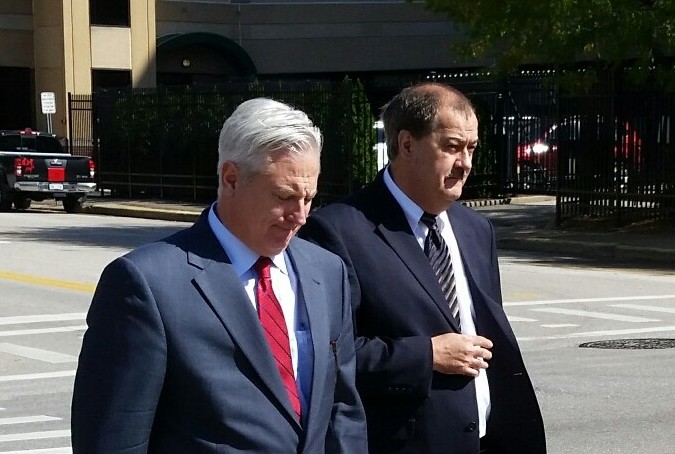CHARLESTON, W.Va. — At the Upper Big Branch Mine in Raleigh County “breaking safety laws was not just permitted, but expected,” according to Steve Ruby, assistant U.S. attorney, who opened the trial of former Massey Energy CEO Don Blankenship Wednesday by attempting to paint Blankenship as a heavily involved executive motivated only by money with little interest in miner safety.
“When Massey made money, the defendant made money,” Ruby said during his opening statement as a slide in U.S. District Judge Irene Berger’s courtroom showed the figure $17 million — Blankenship’s salary in 2009, the year before 29 coal miners were killed in a massive explosion at UBB.

“He wouldn’t win any popularity contests in West Virginia,” Bill Taylor, one of Blankenship’s attorneys, admitted in his own opening statement in which he repeatedly touted Massey Energy’s safety record and what he sees as Blankenship’s role in improving it.
“Mr. Blankenship did not believe that the way to make money in the coal industry was to run roughshod over regulations,” he told the jury.
MetroNews Legal Analyst Harvey Peyton said he believes federal prosecutors are attempting to prove this case is about mining production over safety.
“I found it in my mind thinking United States government is laying out a motive of greed without using the word ‘greed’,” said Peyton.
Opening statements came Wednesday in Charleston Federal Court for Blankenship’s trial following four days of jury selection that ended with a jury of 11 women and four men, including three alternates, being sworn in and instructed.
In her directions to the jury, Judge Berger specifically noted that Blankenship was “not charged with causing the UBB Mine explosion.” It was a statement Taylor repeated multiple times during his 1.5 hour long opening statement that was interrupted multiple times by objections from the prosecution.
Peyton told MetroNews Blankenship may get a fair trial with more women than men on the jury.
“From the standpoint of a male defendant is probably better. Women tend to judge men less harshly than they judge other women, as a given,” he said.
The three charges against Blankenship include conspiracy to violate mandatory mine safety and health standards, making false statements to the U.S. Securities and Exchange Commission and securities fraud.
If he’s convicted of all three charges, the maximum penalty is 30 years in prison.
In the coming days and possibly weeks of testimony, Ruby pledged the federal government would prove those charges using testimony from coal miners who worked at UBB, handwritten notes from Blankenship, phone calls Blankenship recorded in his own office and with help from a “whistleblower” who, Ruby claimed, raised the alarm about the many safety violations at UBB in 2009.
That “whistleblower” who is among those slated to testify is Bill Ross, a former official with the federal Mine Safety and Health Administration, who was hired at Massey in 2008 and helped draft a June 2009 memo detailing his many concerns about Massey’s rampant violations.
“Sooner or later, we will pay the price, especially if there is a serious injury or fatality,” part of that eight-page memo that was sent to Blankenship and other Massey executives read.
Taylor, who disputed the label of “whistleblower” for Ross, told the jury the violations at UBB were no greater than at other Massey mine sites and maintained most citations were corrected within a day.
“No one understood better than Don Blankenship that production and safety were linked,” Taylor said.
He claimed there were “no willful violations” at the UBB Mine and Blankenship was being “singled out” for practices common at UBB before his time, a mine that, according to Taylor, Blankenship was “never in,” one that was managed at the ground level by many others.
“The question that Mr. Taylor asked the jurors to ask themselves is ‘did Mr. Blankenship want violations to occur?'” Peyton said. “And in that regard, made some decent points.”
But Ruby told the jury Blankenship knew exactly what was happening inside UBB daily in detail, sanctioned repeat mine safety violations, lied to the U.S. Securities and Exchange Commission and stockholders about compliance with mine safety regulations and should be held responsible.
Ruby pointed to Blankenship’s alleged instructions to one subordinate at UBB that his directive “must happen exactly the way I want it to happen.”
After hearing the evidence, Taylor said he was confident the jury would find what Blankenship is charged with is “not true, not proved and it’s not fair.” Blankenship’s trial, he claimed, “is about the truth.”

